Chaos and comedy. Death and rebirth. Luck and, uh, running out of luck. A good roguelike doesn't treat the player like other games do. Roguelikes won't guide you helpfully along a path, or let you cinematically snatch victory from the jaws of defeat. They're more likely to dangle you deep between the jaws of defeat and fumble the rope until you go sliding down defeat's hungry gullet. This is their beauty, and it's a part of why we keep coming back for another go. Next time everything will go right. Next time you'll find the right pair of poison-proof loafers, the perfect co-pilot for your spaceship, a stash of stronger, better ropes. Next time.
Here's our list of the 19 best roguelikes on PC you can play in 2024.
Our definition of roguelike is broad. We won't nitpick what constitutes a roguelike versus a roguelite, for example. That argument is for professors and other freaks. For a long time, RPS has joked about the "roguelikelike". This is our way of saying all taxonomy is folly. We could easily headline this article "19 good video games" and call it a day. But as pattern-seeking reprobates, PC gamers crave categorisation (that's why we love games about managing inventory). Meanwhile, as sicko word scribblers, we journos must provide our fellow rogueliker with the greasy meat of good games, regardless of prescriptive definitions. In short, we're not interested in the question: what is a roguelike? We are interested in the question: what are the good ones?
Remember: if you love a particular roguelike, and find it absent from the list, feel free to recommend it to your fellow rascals in the comments. Be nice, we all love drinking potions we don't recognise here. You'll find several readers willing to glug down whatever you're offering. So, with that in mind, here they are...Here's our full list of the final contenders. These links are in alphabetical order, because we know you love the suspense of scrolling to see what's number 1. If you actually HATE doing that, whoa, okay, chill out. You can click a link below to be directed straight to the game.
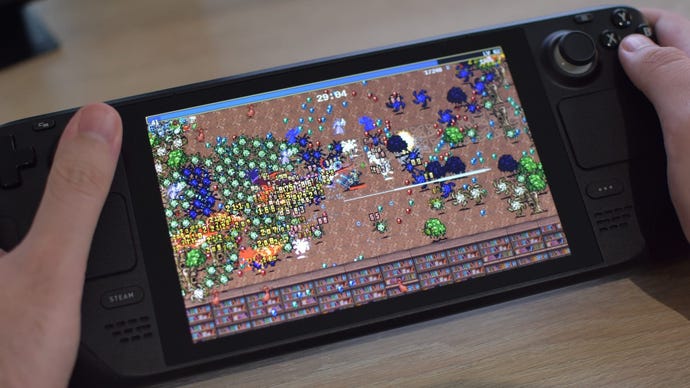
The dirt-cheap popping candy of Vampire Survivors has accidentally created an entire subgenre. And why not? It's so simple. There are basically four buttons to this auto-shooting crowd controller. Up, down, left, and right. Okay, you have to select an upgrade from a level-up menu that appears every minute or so. But that's basically it - collect gems, don't get hurt. You'd think something this straightforward would have caught on decades ago. But no, it took until 2022 for people to realise the most important indivisible part of a video game is "slurp dat jewel". It's not, let's say, a tidy game. The menus look like a phone game from 2009 and the sprites care less about texel density than they do about touching your sweet, sweet collision box. But with every death things get wackier, the screen more full of rando enemies, your pockets full of wilder abilities. Starting up Vampire Survivors is like busting open a 2 kilogram bag of peanuts you buy in LIDL every week because they are coated in some mysterious MSG flavour that you cannot stop eating. Imagine Devil Daggers, but all the enemies have bad knees and you don't have to aim.

Monster Train feels like playing three games of Hearthstone at the same time while snorting a line of Slay The Spire. It is the maximalist speed demon of deckbuilding roguelikes. Each run sees you amassing a deck of malicious minions and wax-headed weirdoes to defend your train's hot furnacey core against the bigoted legions of heaven. Enemies spill into multiple floors and you're forced to think ahead with tactical gambles and wild buffing. As you try and repeatedly fail to keep your train alive, new cards and clans are released, letting you mix many-limbed shadowbastards with vine-covered skincrawlers, among other combinations. Its principal inspiration, Slay The Spire, is a cleaner, more elegant card battler. But Monster Train is louder, wilder, and willing to party.
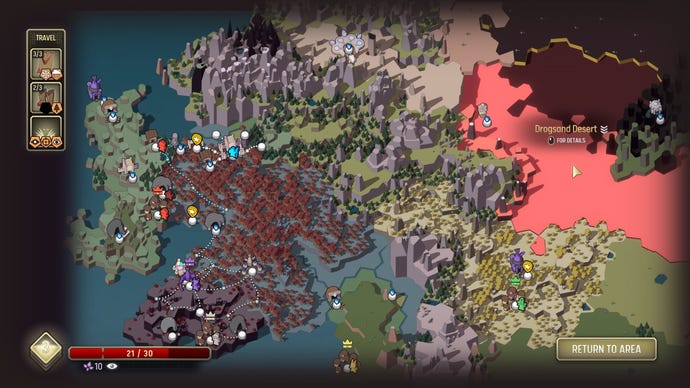
Unexplored 2 does two clever things with regard to its top-down fantasy adventuring. First, it abolishes money. The traders in the game's many towns and settlements will only operate on the barter system. In other words, if you want a new sword, you might need to give up your boots. The second clever thing happens when you die. As your bones sink into the dirt, whole years pass until your next adventurer is ready to go. This happens in seconds, a map of the world changing as factions and evil empires spread and retreat. Meaning friendly places you visited in a former life may now be held by your worst enemies. All this (and other unexpected features) combine to make Unexplored 2 understatedly special. It isn't a fiercely combat-heavy game, rewarding you more for chatting and sneaking than for swinging a sword. But in sticking to its principles of exploration and discovery, it stands apart as a game for those who like to wander.

The roguelike is the realm of the indie. Crunchy pixels, ASCII art, tiny teams, and affordable prices - you'll find no shortage of these things on this list. But what if a AAA studio went big with the genre. What if you applied blockbuster mentality to the dive-and-die game design that every small studio already knows is perfect popcorn gaming? You might come out with something like Returnal. A bullet hellish third-person shooter about a spacewoman trapped in a time loop on an alien world she barely understands. You'll have all the randomised levels and item choices that force you to create a "build" on the hoof, and the slow meta-progression that lets you get a little further into the time loop with every failure. But you also have the mocap and voice acting expected of a PlayStation-published pew-pew. There is an end to your hero's time-trapped terror (big game story gotta have closure) but like all good roguelikes you can continue endlessly if you desire, with the aptly named Tower of Sisyphus mode.
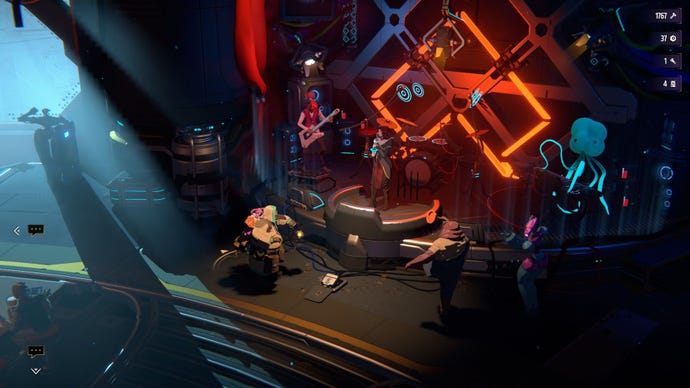
Endless Dungeon was made for turret fans. The kind of gamer who always plays the Engineer in Team Fortress 2, who picks Torbjorn in Overwatch 2, and who won't listen to as you talk about a cool roguelike you're into because they're busy transfixed on the phone playing some random tower defence game about goblins or tanks or... hey. HEY! I'm trying to tell you something here! Ahem. In our Endless Dungeon review it is described as "escorting the mulebot from Deep Rock Galactic through a sci-fi Hades, with tower defence." If you enjoy the twin-stick appeal of blasting your way through a space station for a few floors, while simultaneously managing the routes waves of enemies will take, then here you go. The biggest complaint about this shooty schlockathon is that the "Endless" is a bit of a misnomer - you won't get the same seemingly infinite variety from it as others on this list. And fans of its 2D spiritual predecessor Dungeon Of The Endless may not like the new form. But I will forever defend (with turrets) its door-dashing and desperate last stands.

Gambling has always been a central pillar of the roguelike. Choosing to drink an unlabelled potion is just a thirsty wager against god. Balatro takes things back to the casino. In one sense the game is simple. It is poker. In another sense, it is lunacy. (In a third sense it is actually Big Two, but that's enough senses for now). You are tasked with breaking a ceiling of points by making a strong poker hand. Perhaps you get a full house, well done. Now the points required are tripled. And there appears to be no solution. WRONG. Balatro soon foists upon you weird and wonderful modifiers. Jokers shaped like credit cards which let you go into debt to buy upgrades. Tarot cards that turn all your spades into diamonds. Spectral cyptids that create copies of other cards held in your hand. With each upping of the ante your stack of winnings soars to more ludicrous heights. But we all have to cash in our chips some time.

In the first Darkest Dungeon, success would often ride on how much sanity your troubled band of dungeoneers could retain when faced with horrible odds and freakish monsters. The psychic snapping of one character would often lead to an insanity cascade as things went horribly wrong, fast. In this sorrow-soaked sequel, there is a similarly important system underlying your team's struggles. This time, it is all about relationships. If your team has strong bonds, if they are lovers or best pals for instance, they will buff one another in battle. But if they've gotten rowdy on the road, or harbour some resentment, they will chide and blame each other in the middle of a fight, debuffing one another at the worst possible moments. It's a great way to add some tension, not to mention an excuse to constantly reevaluate your team's composition. Is it really worth having that bitter Doctor around, when everyone dislikes him and he is always insulting the Man-at-Arms? If only we could do something about that...
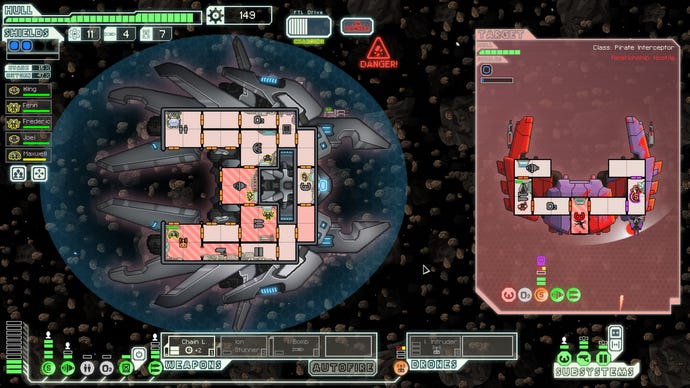
For every failed run in FTL, you will float away with a tiny, glimmering space anecdote. Tell me about the time your hull got ripped open by robots, or the time you had to suspend life support for three people just to have enough power to keep weapons systems alive for one. Or the time you opened the airlock to remove oxygen in engineering, because a fire was threatening to blow the ship to pieces. It didn't matter that your chief engineer was still in there. You had no time, right? Who could judge you? You'll pick up a new engineer in the next system, anyway. FTL was a relatively small game that led the way for a lot of chaotic tomfoolery that would follow. It's not only one of our favourite roguelikes, it's one of our best space games too. And, come to think of it, one of YOURS. Ah, it's so pleasant when we all agree. Huh? You don't? Please step this way and let's talk about it. Yes, this way, into the airlock.
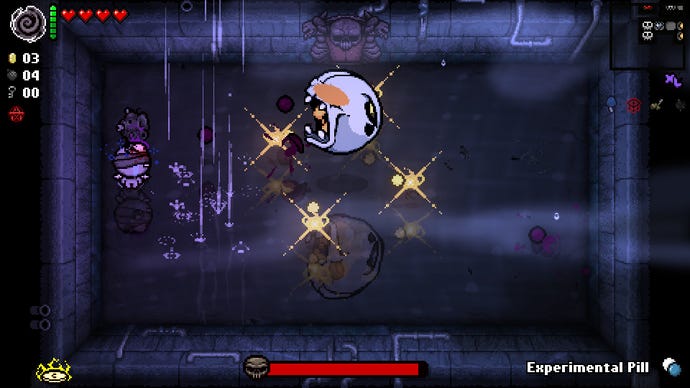
A poo-obsessed roguelike with Zelda-style dungeons in which your hero is a sad foetus who defeats enemies by shooting them with his tears. Yep. Even after all these years it still feels weird to explain. You travel from single-screen room to single-screen room collecting upgrades that will, in theory, make defeating your abusive mother a little easier. Not one for the queasy, developer Edmund McMillen intentionally exhibits his scatological humour alongside religious symbolism with a fervour that will have you worrying about exactly how much urine is going to spill into Satan's face. Hopefully a lot.
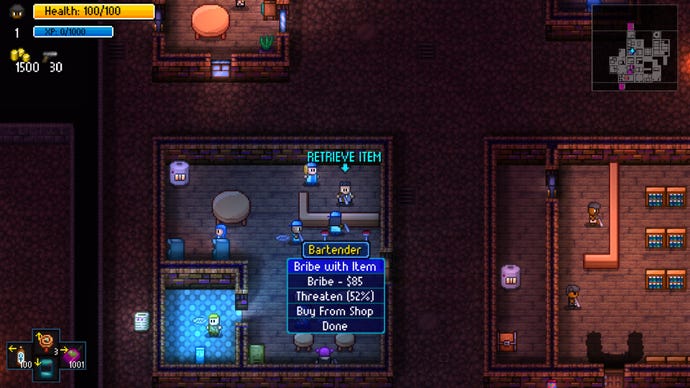
The most valuable currency in Streets Of Rogue is chicken nuggets. The in-universe reason for this is that the mayor (the game's final boss) got food poisoning one time from a pack of nugs, and subsequently banned them. But you will need them to level up your character, a gorilla. No, wait, a robot. No, a vampire. Oh actually, a gangster. A bartender? Hmm, maybe a cannibal this time. Ooo! An investment banker. A hacker. Maybe a shapeshifter. A wrestler today. How about a cop? I think you get the idea. Streets Of Rogue's comedy lies in its unlockable characters and exactly how they will change the way you approach your ascent through its crime-infested sci-fi cityscape. You might hack every ATM on the way up and use the money to hire goons. Meanwhile a co-op friend might just snort enough cocaine to keep themselves supercharged until you both hit the final floor. Honestly, I don't care how you go about it. I'm busy biting people as a zombie and causing a small apocalypse.
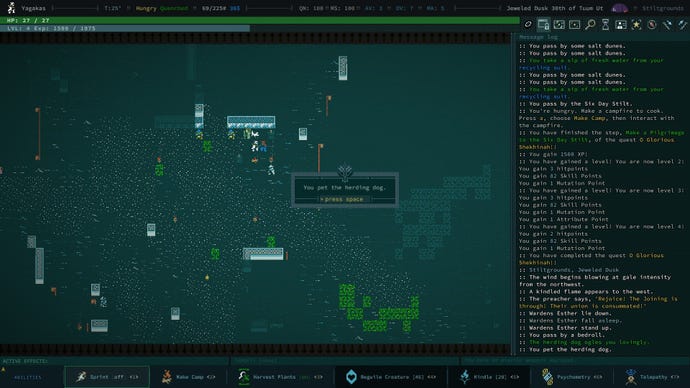
"I'm watching you, traveller," says a voice behind you as you approach a chest that does not belong to you. You turn. There is no one there. Just a small pond. The only living thing nearby is an eel in the water. Hm. You inspect the eel. "I'm watching you, traveller," the fish repeats. It is, according to Caves Of Qud's maximalist descriptivism, a "wet sewage eel and hired guard". You leave the room, and decide not to steal from the chest. This is a mundane encounter by Qud standards, but it's representative of the rich absurdity of this massive post-post-apocalyptic world. On tombstones, you will see descriptions of previous adventurer deaths. "Overdosed on a sphynx salt injector," says one. "Made too many mocking sounds at an ogre ape," says another. The world is dense with ways to die. One of the game's achievements is unlocked if you "Wear your own severed face on your face", raising a number of questions about the fearful depth of its simulation. It is also perhaps the most traditional roguelike on this list, in terms of its presentation and controls. It is as much for roguelike purists as it is for those seeking a fun-loving, low-fidelity RPG of frightening size.

Noita understands wizards. If a wizard found a mysterious wand buried in a deep tomb beneath ominous statues, that robed rapscallion would not hesitate to point it at the first frog and fire it off. Roguelikes have branched out into many flavours since ye olde days of Rogue itself. But one thing many of them have forgotten is the chaos that comes of curiousity. Drinking potions to find out what they do is one thing. Blasting subterranean ghosts with a random glowing stick you just picked up is entirely another, and it gives Noita's dank dungeon dives so much comedy fuel. Even more joy erupts when you understand the importance of swapping spells between wands, and combining the flying sawblades, magical dynamite, teleportation, toxic mist, and watery slurge into a single supreme Idiot Twig that will shuffle the spells like a fatally explosive Spotify playlist. If you played Spelunky and thought "this game is not unpredictable enough", then you are probably a wizard, and Noita is for you.

The brighter alternative to Darkest Dungeon 2, in the sense that Wildermyth too is about the relationships and story that emerges from your characters' journey. There's a lot of tactical turn-basery in this RPG, with fights taking place on a grid in a colourful papercraft world. But its the procedural storytelling and clever narrative mechanisms that make your heroes memorable. And if they get bested in battle they won't necessarily die. Instead they'll often receive a harsh wound that will affect their personal story in unforeseen ways. Unless of course... it makes sense for them to die? This is something more games could embrace. Choice is a hugely important element of roguelikes, and Wildermyth understands that. It trusts the player to shape the arc of a story, even to give the nod for a final act of desperation or heroics. "I cannot possibly express to you how brilliant Wildermyth is," said Sin in our review. "It is one of the best games I have ever played and it will bring you more delight than you thought possible."

The first Risk Of Rain was an out-of-nowhere sci-fi survivathon pitting up to four co-op castaways against waves of alien lizards and robot giants. Its pixel simplicity hid a huge variety of power-ups and relics that changed how each character would fight. Seven years later the developers basically shot their ruckusome roguelike with a big ray gun labelled "turn into 3D" (it was probably more difficult than that, but still). The pixel art disappeared but the magic remained. Up to four friendfolk can now dash around the bright 3D levels of this sequel, scooping up teddy bears that negate damage or gasoline tanks that set crowds of extraterrestrials on fire. It also has a killer soundtrack of electric guitar warbling, giving its drop-in-and-mess-dudes-up action even more spacey appeal.
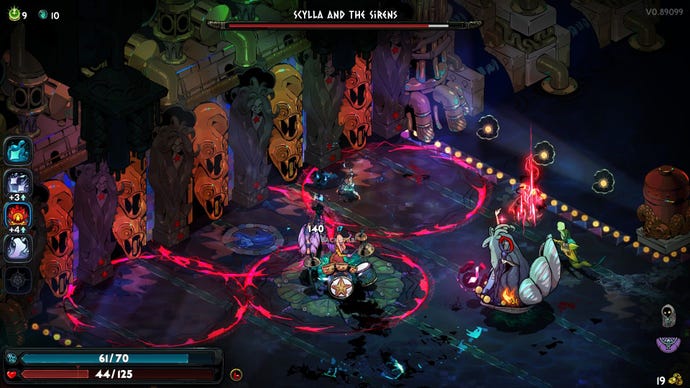
Smite us not. The first Hades is a good game. But this list isn't big enough for two errant spawn of the underworld. Hades 2 builds on the slashing and dashing of its predecessor by giving your new hero, Melinoë, a crowd controlling spell. It's a small but significant change to the rhythm and one that helps propel you downward (and upward) through grim realms full of ancient Greek misfits. Supergiant's storytelling is also out in full regalia, filling your runs with characterful encounters and clever dialogue. In most roguelikes, you chase new powers, upgrades, and gizmos, building a body that can survive a complete run. You still aim for that in Hades 2, of course, but you're also building something else: a cast of weird new friends.
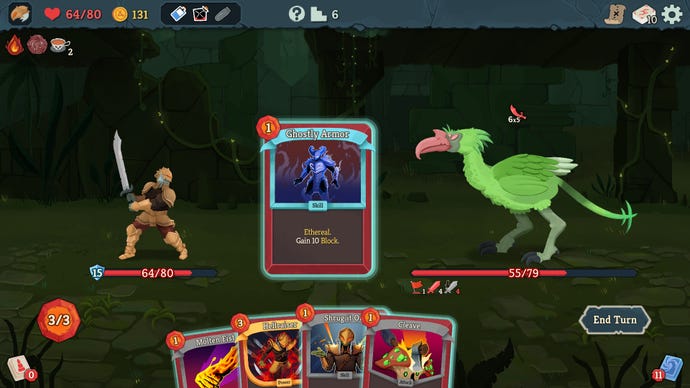
Slay The Spire's mystical power is such that it spawned an entire genre - the roguelike deckbuilder. You can bet your bottom relic there are others on this list that look to its cardy clamber up a surreal spire for direct inspiration. It had a hefty proportion of the RPS treehouse in its claws for months, and it only takes a few runs to see why. It is a game of improvisation and luck, but also one of cunning and craftiness. At it's most basic, you have a hand of cards and a violent freak in front of you. The exact order in which to discard and dispatch cards is your recurring conundrum, but it isn't your only one. Each dive into this dungeon presents you with decision after decision, and the gambles you make in choosing one card over another are as significant as the ethereally perfected arithmetic that underlie the game's design. I could not tell you what half of Slay The Spire's enemies are made from; they are beasts from the sad nightmares of Salvador Dalí's gamer cousin. But I can tell you that finally defeating the most fearsome of them will not quell your thirst for another run. It is likely nothing will.

Run wreck smash jump slam slice heck dash roll oh no slash dash slash jump slash run damn dead. That is the average run in Dead Cells reduced to the stream of consciousness purity of buttonthought. This side-scrapping 2D dying simulator marketed itself, once upon a time, as a "roguevania", not knowing that 8 years and several DLCs later, it would be popular enough to be paired with Castlevania itself. Also, it's getting an animated TV show in French!? Cool. Few roguelikes can boast both an animated series and some of the most sublime feeling stabs and whacks this side of an Xbox controller. Game developers often talk about "juice", the enigmatic fusion of controls, animation, and visual effects that makes a game feel plain good. Dead Cells is not just a great roguelike, it's one of the juiciest games in existence.
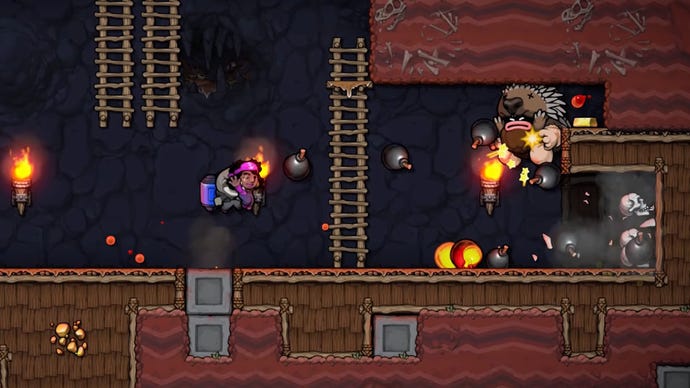
Our Graham calls Spelunky 1 the "best game in the world". So when Spelunky 2 came along, adding turkeys you can ride and moles that dig up from beneath you like a dirt shark, he was thrown into a spiral of confused delight. This platformer roguelike is an escapade generator of random rope climbing, dastardly death traps, and pugs that still need rescuing. The typical feeling of playing Spelunky 2 is that of wonder, followed by hubris, followed by a hilarious cascade of errors that will probably see you accidentally blowing up a shopkeeper and being catapulted into a pit full of bone spikes. This was also true of the first Spelunky, but the sequel refurbishes every procedurally generated biome with new items, enemies and quirks. Everything old is deadly again. All this and more makes it "the best game ever 2", according to our acting editor.
...but he's not the one writing the list! EAT IT, GRAHAM.
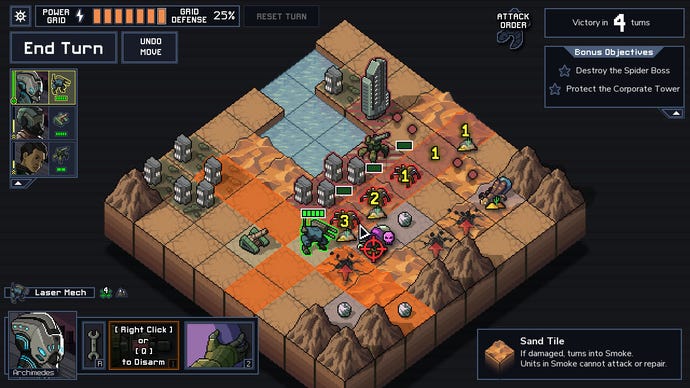
Chess but with giant time-travelling robots. No, that doesn't do Into The Breach justice. Hmmm. Grid-paper XCOM with an undo button. No, that's not it. Turn-based Neon Genesis Evangelion but with an ending that makes sense. Ah, jeez, none of these work. Let's just settle on "best roguelike six years running". The cleverest thing about Into The Breach is also the simplest - it lets you see what's coming. In the same way that Slay The Spire's enemies telegraph their next move, all the horrible kaiju that threaten the skyscrapers of your 8 x 8 dioramaland will show you exactly what they plan to do. It is up to you to move your mechs into the perfect positions to shunt, shove, and shut down those pesky bugs. Some roguelikes are about chaos, about the laughter that comes from disorder, the accidental death resulting from coin-flip decisions that cause everything to go horribly, hilariously wrong. Not so Into The Breach. It is an exercise in searching for the perfect move. And when the perfect move is not obvious, if it is not even possible, then you do the next best thing and hope for the best.
Think we missed a roguelike? It's possible we forgot to open a chest or two as we plundered these depths. But that's what you're here for. Let us know what your favourite roguelike is, and why you love it so much.
Read Again https://news.google.com/rss/articles/CBMiOGh0dHBzOi8vd3d3LnJvY2twYXBlcnNob3RndW4uY29tL2Jlc3Qtcm9ndWVsaWtlLWdhbWVzLXBj0gEA?oc=5Bagikan Berita Ini














0 Response to "The 19 best roguelike games on PC in 2024 - Rock Paper Shotgun"
Post a Comment